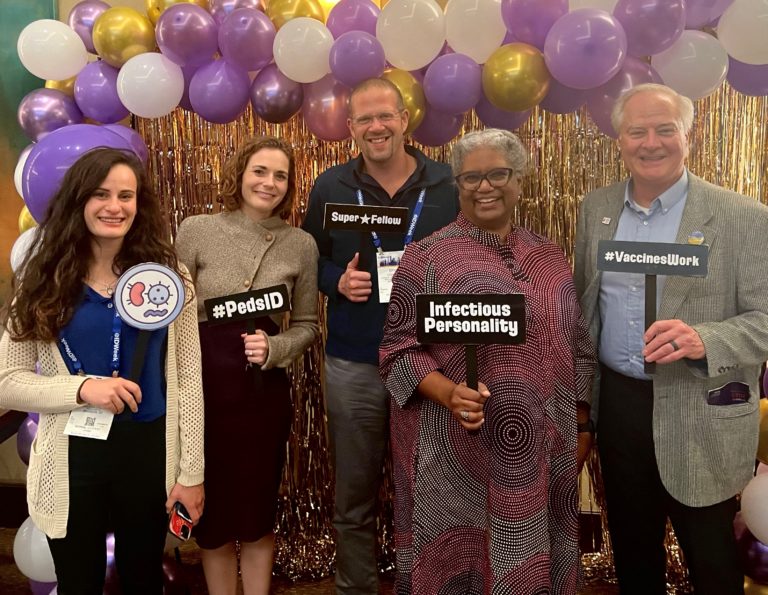An important mission of the Pediatric Infectious Diseases (ID) specialists is to diagnose, treat and prevent infectious diseases in children. In addition, they evaluate children with symptoms that are recurrent, atypical or unexplained, including HIV. They combine clinical care with work as researchers, educators, administrators, hospital epidemiologists and experts in antimicrobial stewardship, immunization programs and infection control.
Our approach utilizes a family-centered model of delivering care, and we encourage involvement of patients and their families in education about their disease. We also share responsibility for the training of medical students, residents, and fellows.
Recent divisional highlights include:
- James Conway, MD, was formally appointed as the University of Wisconsin School of Medicine and Public Health Director, Office of Global Health, responsible for overseeing international programs and student experiences, in collaboration with the other health professional schools. He will continue to serve as Associate Director for the UW-Madison Global Health Institute.
- Medical student Samuel Starke (mentor: James Conway, MD) received a Shapiro Summer Research Award for the project, “Evaluation of School-Based LTBI Treatment Program for Tibetan Schoolchildren with Recent Exposure to Active TB.”
- J. Muse Davis, MD, PhD, former Peds ID fellow, received a five-year, $1,004,400 K08 career development award from the National Institutes of Health, National Institute of Allergy and Infectious Diseases (NIH/NIAID), for his project, “Fungal and Host Factors in Initiation of Cryptococcal Persistence.” To improve understanding of disseminated fungal infections from both the host and pathogen perspectives, he will use a zebrafish larva model to directly monitor microbial pathogenesis in vivo, namely Cryptococcus. He will be supported by primary mentor Anna Huttenlocher, MD, and co-mentors Bruce Klein, MD, and Christina Hull, PhD (Biomolecular Chemistry).
- Infectious diseases fellow Daniele Gusland, MD (mentors: James Conway, MD, and Dawd Siraj, MD [Medicine]), received $25,000 from the University of Wisconsin Global Health Institute for the project, “Etiology and Antimicrobial Resistance Patterns of Neonatal Sepsis in Jimma, Ethiopia (EARNEST).” The team will conduct a 12-month prospective study of 1,000 neonates and young infants admitted to Jimma University Hospital with possible serious bacterial infection, with the goals of identifying the most common organisms responsible for neonatal bacterial infection and estimating the likelihood of successful treatment based on resistance rates to first-line antibiotics.
- Emma Mohr, MD, PhD, former Pediatric ID fellow and current Assistant Professor, received R01 research grant funding from the National Institutes of Health, National Institute of Allergy and Infectious Diseases (NIH/NIAID) for her five-year, $3.8 million project, “Early neural predictors and neuropathogenesis of sensorimotor neurodevelopmental deficits in macaque infants exposed to Zika virus in utero”. This project aims to identify early predictors of neurodevelopmental deficits in children affected by congenital Zika virus exposure so that the functional outcomes of high risk children are maximized.
- Bruce Klein, MD, received R01 research grant funding from the National Institutes of Health, National Institute of Allergy and Infectious Diseases (NIH/NIAID) for his four-year, $1.85 million project, “Lung Epithelial Cell Regulation of Immunity to Inhaled Fungi.” This project aims to increase knowledge about how the lung epithelial cells that line the respiratory mucosa sense and manage inhaled fungal spores, and identify new ways to therapeutically target early events that can optimize mucosal immunity to fungi and lung inflammation.
- Dr. Klein also received a one-year, $49,527 grant from the United States Geological Survey (USGS) National Wildlife Health Center for his project, “The Novel Method for Assessing Vaccines Against White Nose Syndrome Using a Mouse Model.” The project aims to determine vaccine antigens that might be useful in protecting bats against white nose syndrome and to test those antigens in an alternative animal model.
- The State University of New York (SUNY) Downstate Medical Center Alumni Association presented Department of Pediatrics Chair Ellen Wald, MD, with an alumni achievement award in Pediatrics in recognition of her outstanding work as a leader.

